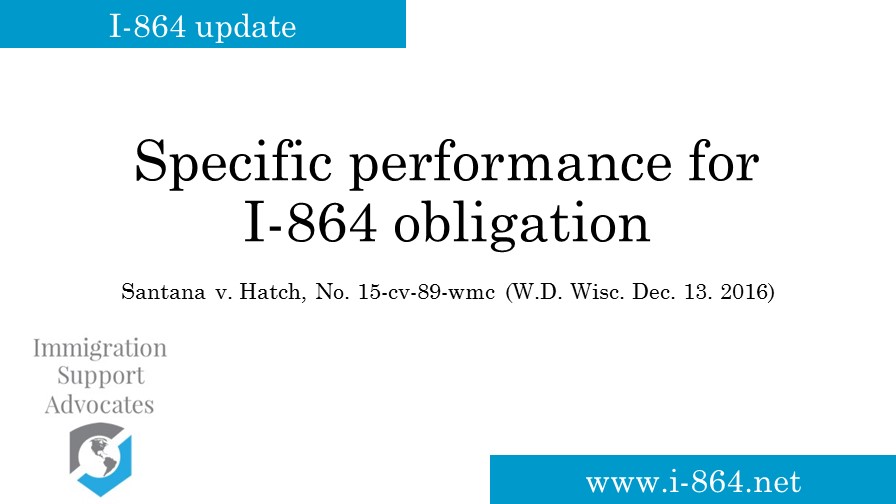
In a December 13, 2016 order, an I-864 enforcement case in federal district court for the Western District of Wisconsin has been resolved. See Santana v. Hatch, No. 15-cv-89-wmc (W.D. Wisc. Dec. 13. 2016) (memo. op.). Following an April order granting partial summary judgment to the immigrant-plaintiff, the only remaining issues were a damages calculation and specific performance of the I-864 duty. “Specific performance” is an order from a court requiring a party to continue a performance required by a contract – here, to make payments required to keep the I-864 beneficiary at 125% of the Federal Poverty Guidelines. The damages calculation was resolved on an agreed calculation, so the only issue addressed in the December 13th order is that of specific performance.
It is common for plaintiffs in I-864 enforcement cases to request both a damages award and also an order of specific performance. But there is a challenge in terms of the logistics required for such an order. The payments due by the I-864 sponsor require an understanding of how much (if any) income the I-864 beneficiary is earning. The sponsor also needs to know if the beneficiary becomes a United States citizen or has been credited with 40 quarters of work.
At Immigration Support Advocates, we typically structure settlements in a way that requires monthly payments by the sponsor. Generally, our clients have little or no income, and depend on the monthly support payments to meet basic needs. In prior cases we have agreed to provide monthly accountings to the sponsor, showing what public benefits were being received and what income had been earned for the month.
In Santana v. Hatch both parties agreed to work our support payments on an annual basis. That is, only one annual payment would be required by the I-864 sponsor, after the beneficiary accounted for earned income. The plaintiff-beneficiary wanted an order that would direct earlier payment if her income fell under 125% FPG for three months. But the Court said that the beneficiary failed to show why this was appropriate:
Under the circumstances, the court concludes that an order of specific performance on a yearly basis is appropriate. Plaintiffs have shown the determination and ability to earn income, as well as support themselves, despite defendant’s obligations to provide minimal support. Currently, Evelyn Santana has a steady job that provides income sufficient to keep her and her family above 125% of the poverty level. [. . .] Thus, at least as of now, there appears to be no justification for requiring defendant to make specific performance on a monthly or bi-weekly basis. On the contrary, as defendant points out, such a requirement could lead to an overpayment to plaintiffs.
In Santana, the plaintiff did not even seek monthly support payments. We believe that in many cases it would be easy to demonstrate that such a payment schedule would be appropriate. A plaintiff who needs ongoing I-864 support by definition has no other income. It would be absurd to make such an individual wait until the end of the year for support that she needs to meet monthly survival needs.
Given that the plaintiff in Santana did not seek monthly support payments, and made no attempt to show why they would be appropriate, we do not believe this case will be injurious to future plaintiffs who do seek orders of specific performance for monthly support payments.